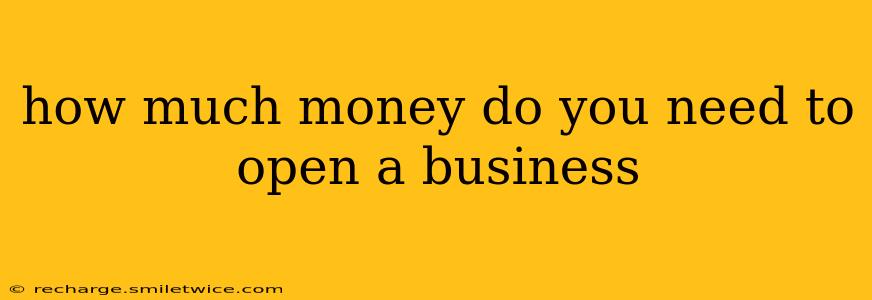How Much Money Do You Need to Open a Business? The Ultimate Guide
Starting a business is exciting, but the financial aspect can be daunting. The simple answer to "How much money do you need to open a business?" is: it depends. There's no one-size-fits-all answer, as the startup costs vary wildly depending on several key factors. This guide will break down those factors and help you estimate your own startup costs.
Factors Determining Your Startup Costs:
Several factors significantly influence the amount of money you need to launch your venture. Let's explore them:
-
Industry: A tech startup will require vastly different funding than a home-based bakery. Tech often involves expensive software, equipment, and potentially a larger team, leading to substantial initial investment. A bakery, while requiring equipment, may have lower overall startup costs.
-
Business Structure: Sole proprietorships typically require less initial investment than corporations or LLCs, which often involve legal and filing fees.
-
Location: Renting commercial space in a bustling city center will be significantly pricier than operating from home or in a less expensive area. Rent, utilities, and other location-related expenses drastically impact your budget.
-
Inventory: Businesses that require substantial inventory upfront (e.g., retail stores, restaurants) need a larger initial investment compared to service-based businesses.
-
Equipment and Technology: This is a critical factor. Do you need specialized machinery, software, computers, or other technology? The cost of these items can range from a few hundred dollars to hundreds of thousands, depending on your industry and business model.
-
Marketing and Advertising: Allocating a budget for launching your business is crucial. Will you utilize social media marketing, paid advertising, print ads, or a combination? Each strategy requires a different level of investment.
-
Legal and Professional Fees: Legal advice, accounting services, and other professional fees add to your initial expenses.
-
Operating Expenses: Consider the costs of running the business for the first few months before you start generating revenue. This includes rent, utilities, salaries (if applicable), and marketing.
How to Estimate Your Startup Costs:
-
Detailed Business Plan: A comprehensive business plan is essential. It should include a detailed financial projection outlining all anticipated expenses.
-
Market Research: Thorough research into your industry helps you understand the typical startup costs for similar businesses.
-
Competitive Analysis: Analyze your competitors' business models to gauge the potential investments required.
-
Detailed Expense List: Create a comprehensive list of all potential expenses, categorizing them (equipment, marketing, legal, etc.). Don't underestimate the costs! It’s better to overestimate and have leftover funds than to run short.
-
Contingency Planning: Always include a buffer for unexpected costs. Things rarely go exactly as planned, so having a contingency fund is crucial for survival.
Where to Get Funding:
Securing funding is a critical step. Here are some options:
-
Personal Savings: Many entrepreneurs bootstrap their businesses using personal savings.
-
Loans: Small business loans from banks or credit unions are a common funding source.
-
Investors: Angel investors or venture capitalists might invest in promising startups.
-
Crowdfunding: Platforms like Kickstarter or Indiegogo allow entrepreneurs to raise funds from the public.
What are the common startup costs?
There's no magic number, but some common cost categories include:
- Legal and registration fees: This varies based on your business structure and location.
- Office space: The cost of renting or buying office space depends on location and size.
- Equipment and technology: This can range from minimal for a service-based business to substantial for a manufacturing business.
- Inventory: This is a significant expense for retail or wholesale businesses.
- Marketing and advertising: The cost of attracting customers varies depending on your chosen strategy.
How much money do I need to open a small business?
For a small, home-based business, you might be able to start with a few thousand dollars. However, for larger businesses with physical locations and substantial inventory needs, you could easily need hundreds of thousands or even millions of dollars.
This guide provides a framework. The amount of money you need to open a business remains highly dependent on your specific circumstances. A well-researched business plan and careful financial planning are crucial for success. Remember to consult with financial advisors and mentors for personalized guidance.
